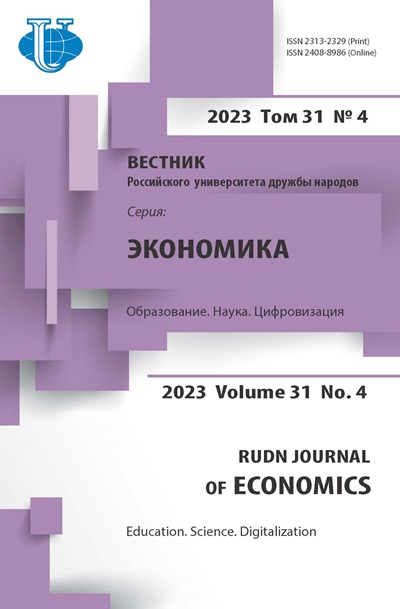Modernization of Mali’s investment policy in the context of improving the sustainable development strategy
- Авторлар: Dembele M.1
-
Мекемелер:
- RUDN University
- Шығарылым: Том 31, № 4 (2023): EDUCATION. SCIENCE. DIGITALIZATION
- Беттер: 668-686
- Бөлім: ECONOMIC GROWTH AND SOCIO-ECONOMIC DEVELOPMENT
- URL: https://journal-vniispk.ru/2313-2329/article/view/324300
- DOI: https://doi.org/10.22363/2313-2329-2023-31-4-668-686
- EDN: https://elibrary.ru/SNURTJ
- ID: 324300
Дәйексөз келтіру
Толық мәтін
Аннотация
Since 2012, the Republic of Mali has been facing numerous security challenges caused by the separatist uprising led by the National Movement for the Liberation of Azawad and many non-State armed groups. This led to a loss of control by the authorities in several areas where the provision of public services and the operation of development programs were disrupted. The base of the economy - the agricultural sector - suffered, on the one hand, due to physical destruction of infrastructure and delays in the construction of new facilities due to limited financial and implementation opportunities, and on the other - due to limited access of households to agricultural resources and modern irrigation methods, which hindered the development of agriculture, expansion of acreage. The devastating consequences also affected other areas of the country. As a result, there is still an urgent need for humanitarian assistance, especially in the northern part of the country, and food insecurity due to the conflict and dependence on weather conditions remains a serious problem. Thus, money transfer programs from major international donors are one of the main sources of functioning of the economy and society of Mali. However, such dependence, in the end, does not benefit the country much in the context of long-term and sustainable development. This is confirmed by the difficulties that have arisen in recent years in connection with the imposed international sanctions. On the other hand, the country has quite attractive investment potential, but foreign investments pursue in most cases purely private interests of investors, ignoring the issue of social responsibility of business and not contributing to the restoration of the social and environmental spheres of Mali. In this regard, the study is devoted to the problem of sustainable development of the country and the possibility of using investment policy tools to implement policy objectives in this area. To this end, the formation and state of Mali’s sustainable development policy is analyzed; the dynamics of the main indicators reflecting the aspects of sustainable development are assessed; the world experience of implementing the concept of “green” investments that had positive environmental and social effects is reviewed. Conclusions are drawn about the need to revise and modernize the policy of attracting investments into the economy of Mali, which will provide additional opportunities for comprehensive development and increasing the level of independence.
Негізгі сөздер
Авторлар туралы
Mama Dembele
RUDN University
Хат алмасуға жауапты Автор.
Email: mams0757@yahoo.fr
PhD student of the Department of International Economic Relations, Faculty of Economics 6 Miklukho-Maklaya St, Moscow, 117198, Russian Federation
Әдебиет тізімі
- Antipov, V.A., & Vasiliev, N.D. (2020). Green investments in the context of sustainable development. StudNet, 3(5), 432–437.
- Bagayoko, N., BaBoukary S., & Sidibé K. (2021). Gestion des ressources naturelles et configuration des relations de pouvoir dans le centre du Mali: entre ruptures et continuité. African Security. Retrieved April 20, 2023, from http://www.africansecuritynetwork.org/assn/gestion-desressources-naturelles-dans-le-centre-du-mali/
- Berkane, I., & Guechi M. (2021). Contribution du financement vert dans la transformation de l’économie vers un modèle de développement durable. Journal of economics studiesand researches in renewables energies, 8(2), 614- 638.
- Bespaly, S.V. (2022). Sustainable investments and their impact on venture capital. Grand Altai Research & Education, 2(18), 3–12.
- Borkova, E.A. (2020). The policy of stimulating green investment as a direction of regulation of the green financing market. Management consulting, (5), 68–76. https://doi.org/10.22394/17261139-2020-5-68-76
- Gnatyuk, S.N. (2019). Investments as a factor of sustainable development of agriculture in Belarus. Working papers “Problems of the economy”, (2), 21–30.
- Goncharova, A.R., & Stoyanova, I.A. (2021). Environmental investments: the role and importance in the sustainable development of large infrastructure facilities. Financial markets and banks, (1), 30–32.
- Grossman, G., & Helpman E. (1991). Innovation and Growth in the Global Economy. Cambrige: MA: Massachusetts Institute of Technology Press, 359 p.
- Hirooka, M., Watanabe C. (2007). Innovation Dynamism and Economic Growth. A Nonlinear Perspective. Journal of Evolutionary Economics, (17), 649–652.
- Kalyagina, L.V., & Pyzhikova, N.I. (2009). Factors of sustainable development of the agroeconomic system. Vestnik SibSAU. Aerospace tehnologies and control systems, 5(26), 149–154.
- Karpushova, S.E., Takhumova O.V., & Israilova, Z.R. (2021). Priorities of Sustainable Development of the Territory: Ecology, Human Development, Economic Security. Research for Development, 23–33. https://doi.org/10.1007/978-3-030-70194-9_3
- Kormishkina, L.A., & Kormishkin, E.D. (2022). Environmental investment is a powerful “support” for the progressive and sustainable growth of the post-pandemic economy of Russia. National security / nota bene, (3), 28–44. https://doi.org/10.7256/2454-0668.2022.3.38346
- Sharova, A.Y. (2020). Investments in Africa’s electric power industry and their role in overcoming the continent’s energy backwardness. Contours of global transformations: politics, economics, law, 13(6), 181–197. https://doi.org/10.23932/2542-0240-2020-13-6-10
- Shugurov, M.V. (2019). Investment aspects of international technology transfer in the interests of sustainable development. Economics and Business: Theory and practice. (11–3), 188–197. https://doi.org/10.24411/2411-0450-2019-11421
- Smirnov, E.N., & Lukyanov, S.A. (2021). Global foreign direct investment: structural changes in the conditions of the current crisis. Region’s economy, 17(3), 1014–1026. https://doi.org/10.17059/ekon.reg.2021-3-21
- Tsaregradskaya, Yu.K. (2022). “Green” investments in the context of sustainable development: features of legal regulation. Bulletin of the O.E. Kutafin University (MSLA), (8), 116–123. https://doi.org/10.17803/2311-5998.2022.96.8.116-123
- Yakovlev, I.A. (2019). Formation of the “green” segment of the national financial market: the experience of countries with a significant share of the raw materials economy. Economics and Management. (9), 13–22. https://doi.org/10.35854/1998-1627-2019-9-13-22
- Yerlygina, E.G., & Vasilyeva, A.D. (2020). Investments in the agro-industrial complex as a factor of sustainable development of the state. Bulletin of Science and practice, 6(10), 253–257. https://doi.org/10.33619/2414-2948/59/25
Қосымша файлдар








